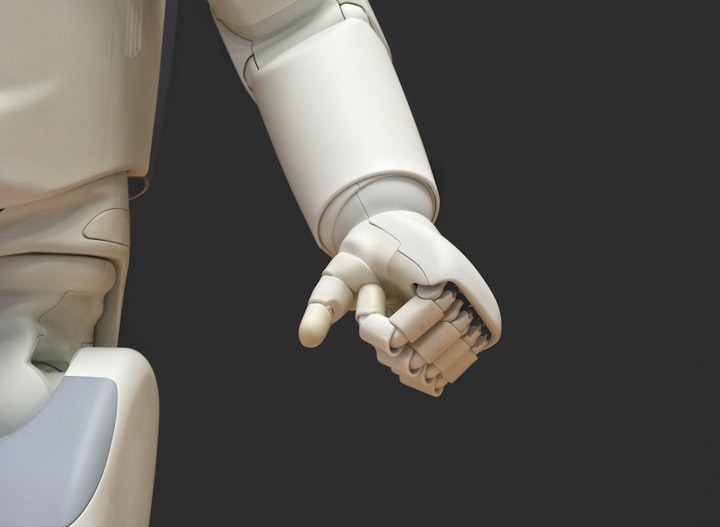
David, both the physical person himself and the network of social, cultural and technological systems he interacted with, was the first human being to be successfully “represented” on July 1st 2030, 10:14 AM, according to Abstract Engineering CEO Solomon Yang in his latest media briefing. After years of careful data collection and processing, occurring parallel to groundbreaking research in robotics, David’s physical body was reconstructed in android form, and his personality faithfully implanted in this machine.
This process was, of course, not perfect. Both the body and the mind of David, the human being, were far too complicated to copy exactly into David, the machine. Major physiological flaws could be recreated, but the numerous minuscule imperfections and misfirings in David’s body would be his alone to keep. The machines recreated mind too, however complex, would only ever be an approximation to that of the human being.
In any case, Abstract Engineering’s goal was never to recreate the human being in body and mind, it was to provide a product thought to be worthy of selling, and the machine was more than adequate. The machine managed to convince a statistically representative sample of David’s family and friends that it, in fact, was David. It also proved to be an extremely accurate predictive model of David’s mind in most day-to-day interactions. At one point, a researcher, posing as a telemarketer, called and recorded a conversation with David, attempting to convince him to switch providers. Following the same script exactly, including the same emotional cadences in speech, the researcher attempted the same conversation with machine David. The responses were identical. Word for word.
There has been some speculation as to why David was representable, where up to this day so many others have not been. Advances in artificial intelligence have rendered most people economically obsolete. The average person lives in relative ease, pursuing whatever physical, emotional, social, or artistic passions they desire. They are healthy, and want for very little. To say David the man is without passion is a step too far. He clearly loved his family and his friends. He did well in school and has some talent. What he lacked was desire, and apathy seems to be a representable quality.
Despite this, David the machine was the proof of concept Yang and his small team had been looking for. A small horde of investors saw the potential, and scrambled to be the first to finance the start-up. David was marketed fiercely. Imagine having a representative of your favourite celebrity in your living room! Leave your represented self to your family after you pass away! Automate your daily social obligations! Billionaires and entertainment companies were able to pre-order their representations at high cost. Abstract Engineering had a plan. Others were going follow.
The represented David was provided with a representative apartment in a representative city, and its “life” recorded and broadcasted on every social media platform. Viewers could watch in amazement while the machine shopped online and did its laundry. “Thats just like my David!”, the man’s mother exclaimed in a reaction video, as the android failed to do a push-up. Scholars studied and exposited on the represented David’s consciousness and rights. Activists protested the machines subjugation for marketing and entertainment.
Even David the man was at one point implicated in the product’s advertising. “I’m just proud to be part of something important.” He once said to an interviewer, while watching a live video of his mirror image brush its artificial teeth.
The excitement however, was not long lived. Out of the thousands of representation procedures started, no other than David’s was successful. Many participants were deemed incompatible with the technology, and their processes ended in failures. Others were considered to be possible, but ultimately failed to terminate. Perhaps some of these could have been successful, given a longer timeframe.
“The algorithm is correct! Just give it time!” Yang pleaded, as the pre-orders stopped being placed.
Yet, Abstract Engineering had enough funding to last for years. Protestors were able to convince the government to pay for the machine’s apartment, upkeep, and way of life while other representations were processed.
David’s representation failed to be interesting enough to keep its social media following. Like David the man, David the machine was a model of contentment. It was happy in its consumption. It followed the rules and was no more a burden than anyone else. Originally the machine was planned to be reset to its original configuration every so often, to keep it from possibly diverging too much in experience and character from David the man. But this practice was soon halted after the first few resets. If the machine was only a model of contentment, the man was contentment itself.
Eventually the AI market shifted towards “more than human” intelligences, and Abstract Engineering followed suit, all but abandoning the representation project. Eventually the machine was turned off, as the project was shelved. “It was nice to be a part of something”, David the man said while shaking Solomon Yang’s hand during the pseudo-ceremony marking the end of the project, a grin on his face. Yang smiled back at the man before executing the shut-down command for his representation.
A middle aged Yang attended the funeral of David the man years later, watching the only man to be understood by his algorithm be lowered into the earth.





Comments
There are no comments for this story
Be the first to respond and start the conversation.